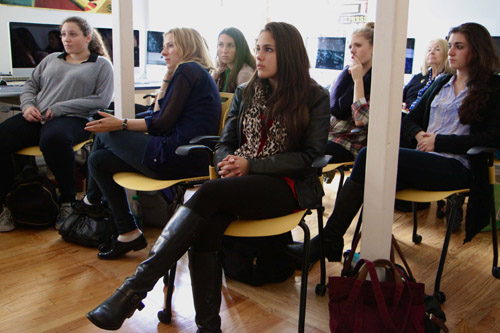
“سوال اپنی فلم بامعنی گفتگو لانے کہ نئی کہانی سنانے پارستیتیکی نظام کا ایک لازمی حصہ بن بنانے کے لئے کس طرح ہے, سماجی مشغولیت کو فروغ دینے اور مواد کی تقسیم کے لئے نئے راستوں کی وضاحت.” — کریگ Hatkoff
Perhaps the next Kathryn Bigelow is in this film class of high school seniors? اگر ایسا ہے تو, وہ 21st صدی فلم سازی کے حقیقی دنیا کے لئے تیار کیا جا رہا ہے کہ کس طرح?
کورس, she may not like being referred to as “the next Bigelow.” Bigelow’s success is inspiring to study, لیکن “the next innovative filmmaker” may be dreaming of forging new territory in the world of story-telling: a visionary whose art will stand out above the rest of the celluloid and contribute unique, ground-breaking work to our culture. How will she do that in the rapidly changing world of entertainment?
کریگ Hatkoff, co-founder of Tribeca Film Festival and creator of the Tribeca Disruptive Innovation Awards, one of the major highlights of that annual film industry event (the founders of Kickstarter, ٹویٹر, Wikipedia and TedX have been honorees) texts: ” To stand out beyond the normal statistical probabilities, filmmakers will need to invert the box. Today’s dogma will become tomorrow’s broken business model. سوال اپنی فلم بامعنی گفتگو لانے کہ نئی کہانی سنانے پارستیتیکی نظام کا ایک لازمی حصہ بن بنانے کے لئے کس طرح ہے, foster social engagement and define new pathways for content distribution. Spend 90% of your time talking to non-incumbent players with whom you can create new content value chains.”
A film teacher at the Dwight School on the upper west side of Manhattan takes seriously the mentoring of his all girl senior film class on the diverse range of career opportunities in the real biz. As an extension of his students’ normal studies, نک Lindner (who works on award-winning film and TV productions when he’s outside of his classroom) invited an impressive line-up of directors, producers, cinematographers and other specialists, with accolades ranging from Emmys to a MacArthur, for a week of presentations. It was my pleasure to chat with Nick as well as with Sound Mixer and Editor Eric Diebner; Cinematographer, 5 time Emmy Award winner and Owner of Air Sea Land Productions, انتھونی کینوس; Senior Lighting Designer and 3 time Emmy Award winner Mike Grabowski; Documentary and Feature Film Producer Anna Rose Holmer; and Head of Post-Production for A24 Films, لارین ایلمر, about the rapidly changing and challenging world of moving pictures.
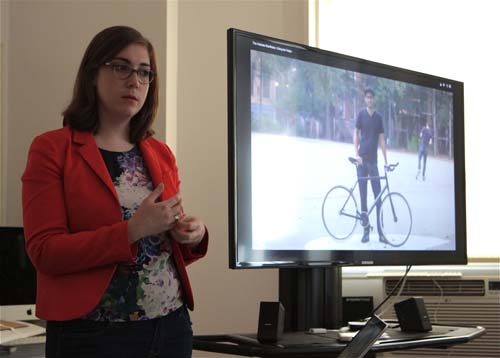
“Experiment and take big risks.” — انا گلاب Holmer
How did you all get started in TV/Film?
ایرک Diebner: I got started in the film industry by interning for a production company. I earned my certification in Audio Technology at the School of Audio Engineering.
انتھونی کینوس: Right out of high school. My acting teacher’s husband was a director for CBS at the time. I was introduced to the engineer of the company that provided all the video equipment for this director’s project. He introduced me to the owner of the company, Eric Duke of All Mobile Video. I worked for All Mobile for approximately six years.
مائیک Grabowski: I was a theater guy since high school and decided to pursue that as a career. College training happened at SUNY Purchase Entertainment Design Conservatory. I continued on that path for a bit. Technical drafting became a good bit of business for me and I happened to do it for a television design firm, The Lighting Design Group.
انا گلاب Holmer: I worked in the dark room and as a photographer’s assistant during high school. I went to NYU’s film program, with an early focus on cinematography.
لارین ایلمر: I studied film in college and interned for an independent film production company when I moved to New York and eventually got hired.
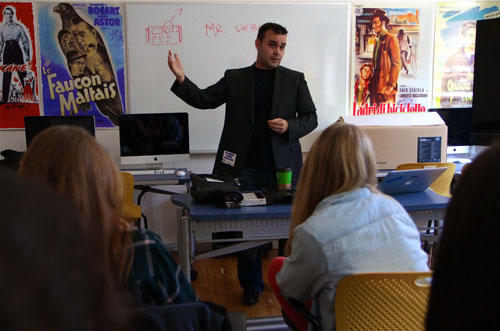
“People in this industry don’t look to hire someone that edits, does lighting, manages shoots, and does sound. They are seeking the person that has mastered one talent.” — ایرک Diebner
How hard is it for filmmakers to break into the business today?
ایرک Diebner: You really have to live and breathe this industry and pay your dues. For me there is nothing like it. I enjoy my job every day. Your whole life can change in an instant with a handshake with the right person.
انتھونی کینوس: If you are willing to put in a lot of hours work for relatively nothing, with very little experience (believe it or not) your chances of getting into this business can be pretty easy.
مائیک Grabowski: Realize there is a ladder to climb. Never look down on so-called “lesser positions.” Don’t expect the path to be a straight one. Get in at the ground floor. Work as a PA. Work as a draftsperson. Work in the production offices. Work at places you never thought you might.
لارین ایلمر: Networking is key and it’s important to be loyal to the relationships you start to build over time. This may not always lead to a job but they can still offer guidance along the way.
If you had one piece of advice to give to a student wanting to work in the media business today, what would it be?
ایرک Diebner: Don’t become a jack-of-all-trades, master of none. People in this industry don’t look to hire someone that edits, does lighting, manages shoots, and does sound. They are seeking the person that has mastered one talent.
انتھونی کینوس: Understand financing and distribution of a project.
مائیک Grabowski: Be aware that everyone is passionate and wants to create and make films that are going to CHANGE THE WORLD. Passion is a beautiful thing but it’s easy to have it taken advantage of.
انا گلاب Holmer: Experiment and take big risks.
لارین ایلمر: Understand how the industry is evolving on a digital level. Not just how films are getting released but how marketing campaigns are becoming heavily dependent on social media. Trades are a great resource to stay ahead of the game as the distribution model continues to grow and change.
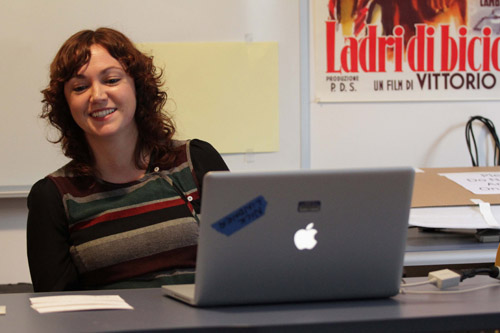
“There has certainly been a shift toward VOD. I think allowing more outlets for people to access content can only help the industry.” — لارین ایلمر
What skills do you believe a young filmmaker needs to make it in today’s world?
انتھونی کینوس: Today’s filmmaker needs to understand all the technical aspects. He/she should know how to operate a camera, the differences in cameras, recording sound, لائٹنگ, directing and producing. Client budgets are limited.
Michael Grabowski: Today’s filmmaker has exposure to technology and other resources unlike any other time or generation. But sometimes it’s important to go back to fundamentals. The visual part is first and foremost. Being able to talk composition, ڈیزائن, color theory, art history and have a comprehensive design vocabulary is essential.
انا گلاب Holmer: Understanding how to hone your craft into a sustainable business is the most important shift young filmmakers can make towards working as professionals. Financial literacy and business skills are required.
What skills did you learn in the real world that you did not learn in Film/TV school?
انتھونی کینوس: آج کی دنیا میں, a camera comes in one week and is replaced the next. A good understanding of digital acquisition and data preservation is key.
مائیک Grabowski: Don’t be a jerk. You may be the best at what you do or not, but you and the entire production team have to work together. It is ultimately a collaborative effort.
انا گلاب Holmer: One of the things that I love is that you continue to learn all of the time. In every job I take there is a new element to consider that I haven’t encountered before. I am constantly searching for new solutions to financial, logistical, and creative problems.
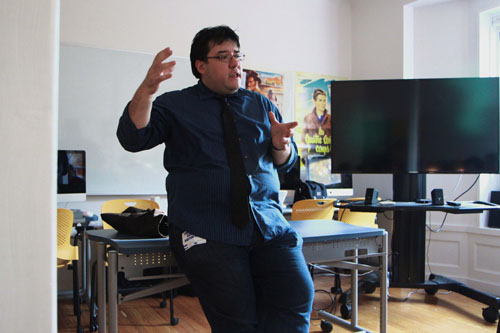
“Today’s filmmaker has exposure to technology and other resources unlike any other time or generation. But sometimes it’s important to go back to fundamentals. The visual part is first and foremost.” — مائیک Grabowski
George Lucas and Steven Spielberg have said the film industry is heading toward a cliff. Conservative programming choices and rapidly evolving distribution schemes have set the stage for a massive upheaval. They also believe that internet-based services may become the dominant medium. آپ کے خیالات کیا ہیں?
ایرک Diebner: I do a lot of TV and not as much film. I have to disagree because there are so many opportunities for young people. I think the Internet is blowing up with work. It opened the doors to be creative and have different industries combine. Although the price of actual cameras has dramatically decreased, it has allowed “اوسط” consumers the accessibility to gain experience with equipment versus only professionals having access. I have realized that there will always be a need for professionals as well as professional equipment. Even HD is wearing out, and 4K, which is double the resolution of HD, and ultra HD TV’s are on their way. There is always something new that’s pushing the boundaries of this industry. This challenges us to stay current and versatile.
انتھونی کینوس: With all the options for showing a project today, the industry has gotten very diluted. The cost of production and the price that people are willing to pay (when some shows are about quantity not quality) has threatened a lot of great talent. حقیقت ٹی وی (میری رائے میں) has dulled the average viewer. Most cannot even recognize poor image quality and content. The consumer went out and bought the best HDTV sets yet when they got home to watch, a lot of the broadcasters were showing cell phone videos, GoPro videos, and Skype interviews. As long as people don’t notice or demand better images, the networks will keep looking for consumer provided content to feed the masses their programming.
مائیک Grabowski: The method of delivery of content has changed and will continue to evolve. There is something nice about gathering around a TV with loved ones and sharing the experience. There is something primitive about it, hardening back to more primitive days of huddling around a fire and telling stories. I don’t think that aspect will change entirely.
لارین ایلمر: There has certainly been a shift toward VOD. I think allowing more outlets for people to access content can only help the industry. There are many independent films that come out of big festivals that aren’t always released theatrically but are available on digital platforms like iTunes.
Nick what would you say is the most important thing you learned from teaching Film in the classroom that has helped you in the real world of film?
نک Lindner: I appreciate the global approach to learning that the International Baccalaureate film program fosters more than anything else. It encourages me to constantly look outward beyond Hollywood at the impact of world cinema. I’ve been challenging myself to go beyond teaching classic global film movements such as Italian neorealism or French New Wave, and embrace topics such as South Korean distribution models, Mexican auteurs or Iranian censorship issues. This tinkering with the curriculum forces me to improve upon my own understanding of film and has allowed my approach to production practices to evolve.
For more information on the Dwight Film Program: visit www.dwight.edu

Photos courtesy of Dwight School.
تعلیم کے لئے عالمی تلاش میں, سر مائیکل باربر سمیت میرے ساتھ اور عالمی سطح پر معروف فکری رہنماؤں (برطانیہ), ڈاکٹر. مائیکل بلاک (امریکہ), ڈاکٹر. لیون Botstein (امریکہ), پروفیسر مٹی Christensen کے (امریکہ), ڈاکٹر. لنڈا ڈارلنگ-ہیمنڈ (امریکہ), ڈاکٹر. مادھو چوہان (بھارت), پروفیسر مائیکل Fullan (کینیڈا), پروفیسر ہاورڈ گارڈنر (امریکہ), پروفیسر اینڈی Hargreaves نے (امریکہ), پروفیسر کریں Yvonne ہلمین (نیدرلینڈ), پروفیسر کرسٹن Helstad (ناروے), جین Hendrickson نے (امریکہ), پروفیسر گلاب Hipkins (نیوزی لینڈ), پروفیسر Cornelia Hoogland (کینیڈا), فاضل جیف جانسن (کینیڈا), مسز. چینٹل کوفمین (بیلجیم), ڈاکٹر. Eija Kauppinen (فن لینڈ), سٹیٹ سیکرٹری Tapio Kosunen (فن لینڈ), پروفیسر ڈومینک Lafontaine (بیلجیم), پروفیسر ہیو Lauder (برطانیہ), پروفیسر بین لیون (کینیڈا), رب کین میکڈونلڈ (برطانیہ), پروفیسر بیری McGaw (آسٹریلیا), شیو ندار (بھارت), پروفیسر R. نٹراجن (بھارت), ڈاکٹر. PAK NG (سنگاپور), ڈاکٹر. ڈینس پوپ (امریکہ), شریدر رازگوپالن (بھارت), ڈاکٹر. ڈیانے Ravitch (امریکہ), رچرڈ ولسن ریلی (امریکہ), سر کین رابنسن (برطانیہ), پروفیسر Pasi Sahlberg (فن لینڈ), پروفیسر Manabu ساتو (جاپان), Andreas کی Schleicher (پیسا, او ای سی ڈی), ڈاکٹر. انتھونی Seldon نے (برطانیہ), ڈاکٹر. ڈیوڈ Shaffer کے (امریکہ), ڈاکٹر. کرسٹن عمیق کر رہے ہیں (ناروے), چانسلر اسٹیفن Spahn (امریکہ), ایوز Theze (اسکول Français کی امریکہ), پروفیسر چارلس Ungerleider (کینیڈا), پروفیسر ٹونی ویگنر (امریکہ), سر ڈیوڈ واٹسن (برطانیہ), پروفیسر Dylan کے Wiliam (برطانیہ), ڈاکٹر. مارک Wormald (برطانیہ), پروفیسر تیو Wubbels (نیدرلینڈ), پروفیسر مائیکل نوجوان (برطانیہ), اور پروفیسر Minxuan جانگ (چین) وہ تمام اقوام کو آج سامنا ہے کہ بڑی تصویر تعلیم سوالات دریافت کے طور پر.
تعلیم کمیونٹی پیج کے لئے گلوبل تلاش
C. M. روبن وہ ایک موصول ہوئی ہے جس کے لئے دو بڑے پیمانے پر پڑھا سیریز کے مصنف ہے 2011 میں Upton سنکلیئر ایوارڈ, “تعلیم کے لئے گلوبل تلاش” اور “کس طرح پڑھیں گے?” انہوں نے تین bestselling کتابوں کے مصنف ہیں, سمیت Wonderland میں یلس اصلی.
C پر عمل کریں. M. ٹویٹر پر روبن: www.twitter.com/@cmrubinworld






حالیہ تبصرے